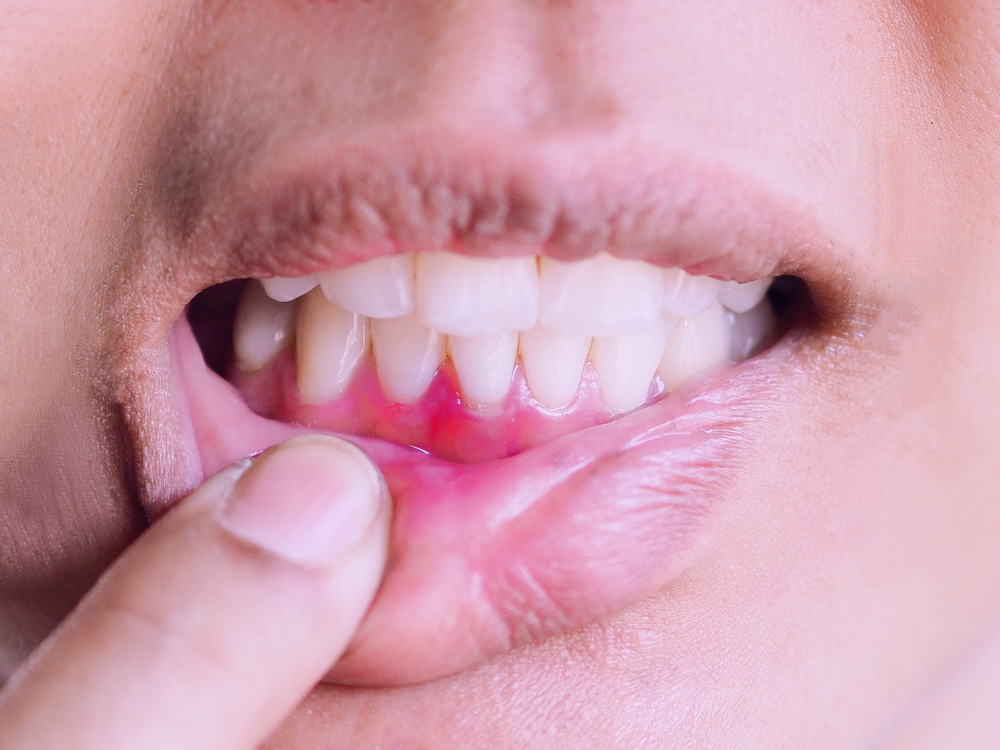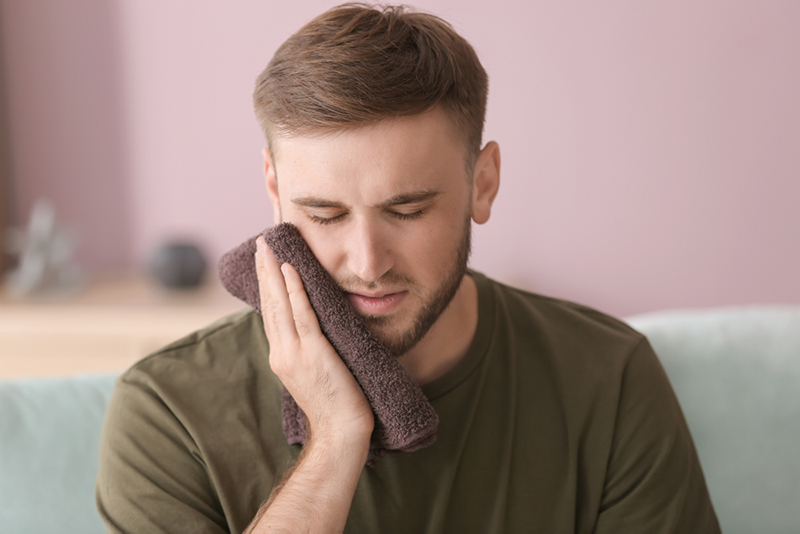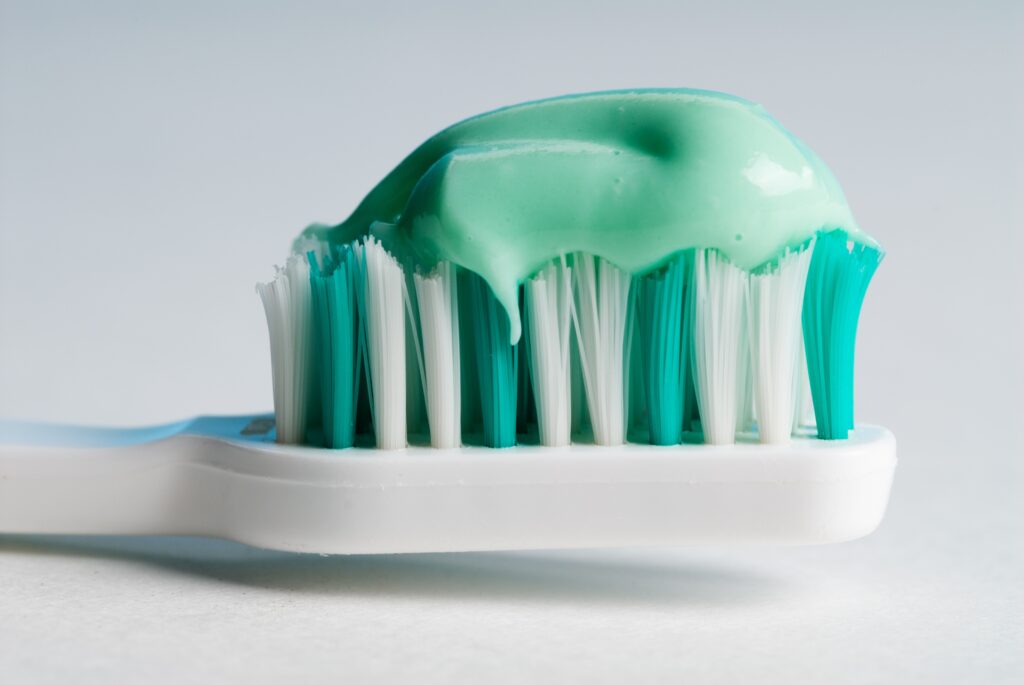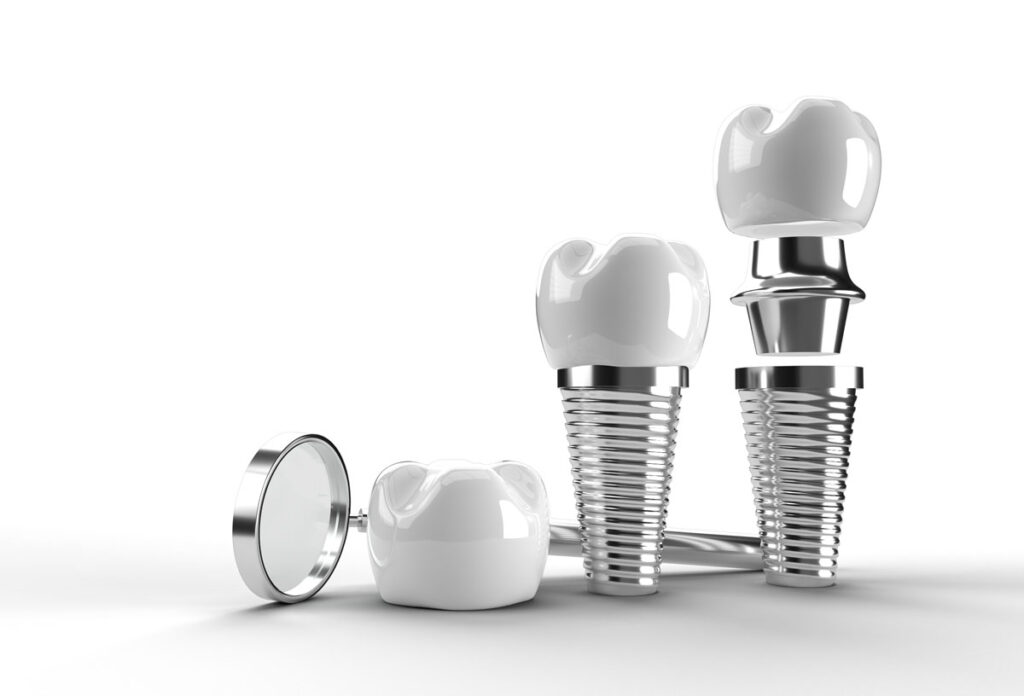Gum pain can not only be uncomfortable, but it can be worrisome. However, having red and tender gums isn’t necessarily a sign that you have major dental problems—in fact, it’s pretty common. Many things can cause gum inflammation, even something as simple as changing your toothpaste.
Before you panic, there are some things you can try at home to find relief and get your gum health back to normal. In this guide, we’ll go over the potential causes of gum inflammation and how to treat swollen gums, so you can start feeling better. Read this post from start to finish for a complete overview of gum irritation and gum swelling treatment options. Otherwise, you can use the links below to find the section that best answers your question.
- What Causes Swollen Gums?
- Why Is It Important to Treat Swollen Gums?
- Do I Need a Dentist to Treat Swollen Gums?
- How to Treat Swollen Gums at Home: 12 Home Remedies
- How to Prevent Swollen Gums
- Keep Your Gums Healthy & Pain Free
What Causes Swollen Gums?
Swollen gums are a fairly common problem that many people experience throughout their lifetime. You might notice a combination of swelling, tenderness to the touch, and even redness—these are all normal symptoms when the gums are irritated. That said, what’s causing your gum swelling and how long it persists are both important things to pay attention to. However, that might be easier said than done.

To help you with your first step to recovery, let’s review some of the most likely potential causes for your gum pain. According to the American Academy of Periodontology, there are many factors that can contribute to gum swelling and infection. Some of the most common causes of swollen gums include:
- Poor dental hygiene: Neglecting to brush and floss as directed by your dentist can have a serious impact on your oral hygiene, including gingivitis.
- Pregnancy: Plaque can build up more easily when you’re pregnant because of hormonal changes, which may result in gum swelling and sensitivity.
- Changing dental hygiene products: New toothpaste or mouthwash may have a harsher formula that leads to irritation.
- Aggressive brushing: Using too much pressure to brush your teeth, especially with an electric toothbrush, can cause gum irritation.
- Improper flossing: Flossing may seem pretty straightforward, but your technique may be causing gum irritation if you’re aggressively moving the floss back and forth across your gum line.
- Vitamin deficiency: If you have an unbalanced diet that lacks important nutrients like vitamins B and C, your gums can become inflamed.
- Whitening products: Whitening strips and gel can easily get onto the gums. When this happens, the bleaching agent can cause irritation on the sensitive gum tissue.
- Braces, retainers, or dentures: Wearing a dental appliance can irritate your gums because they often rub against this sensitive tissue. These dental appliances can also make it more difficult to reach all the surfaces of your teeth, leaving particles behind.
- Smoking: According to the CDC, smoking weakens your immune system, making it easier for your gums to become infected. Additionally, the chemicals in tobacco can also cause gum irritation and affect saliva flow, allowing for more bacteria to settle.
- Allergies: Sensitivities to certain ingredients, spices, and even seasonal allergies can contribute to gum swelling.
- Health conditions: Gum swelling may be a side effect of certain diseases and medical conditions such as diabetes.
- Taking certain medications: Certain medications may cause dry mouth, which can contribute to gum inflammation.
- Wisdom teeth: As wisdom teeth erupt, they have to come through the gum tissue, just like all your other teeth. This can cause pain and swelling that can last for long periods of time. If you’re experiencing a lot of pain, you may want to notify your dentist as it could be a case where the wisdom teeth are partially trapped below the gum line, which can be highly problematic.
Certain medications or medical treatments may also contribute to gum swelling, so you may want to check in with your doctor to see if that could be the cause if you’ve eliminated these other factors as potential causes.
While many cases of gum discomfort are related to plaque build-up and gingivitis, gum pain may also be related to canker sores or cuts—which are much easier to manage and should only last a few days at most.
Why Is It Important to Treat Swollen Gums?
Allowing your gum inflammation to go untreated can cause the condition to worsen. While mild gingivitis can generally be easily treated at home, it can escalate to gum disease if proper corrective actions aren’t taken. Healthy gums are the foundation of a healthy smile. According to MouthHealthy.org, gum disease can wreak havoc on your oral health. Over time, infected gums can lead to bone loss and tooth loss, which require much more extensive (and costly) treatment.
Not only that, but this bacteria could potentially enter your bloodstream, resulting in other serious problems that impact your full-body health. Having gum disease can increase your risk of health issues such as stroke, heart attack, and heart disease.
While a little gum irritation and inflammation might not seem like a big deal, as you can see, it could turn into something much more severe if you don’t take it seriously. Because of the all-encompassing problems that can stem from untreated gingivitis, it’s important to not only manage gum inflammation at the earliest stage possible, but to have your gum health checked out if something seems off.
Do I Need a Dentist to Treat Swollen Gums?
In some cases, you may need to see your dentist. If you’re experiencing severe gum pain and you can’t find relief with some simple changes to your routine, you might need to consult your dentist.
How do dentists treat swollen gums? Depending on the severity of gum swelling and the underlying cause, there are several types of swollen gum treatments the dentist may recommend:
- Deep cleaning: A deep cleaning, also known as scaling and root planing, can help restore your oral health by removing plaque and bacteria from below the gum line.
- Periodontal Maintenance: This is a less-intensive and less-expensive version of deep cleaning, that can be done if the situation is not as severe. Many dentists often recommend this is done every few months after the full deep cleaning to keep gingivitis under control.
- Medication: An antimicrobial rinse or antibiotics can be provided as a swollen gum treatment to help control plaque and gingivitis.
- Gum surgery: There are several surgical gum treatments that can be provided for more severe cases of gum disease where there has been more extensive damage like receding gums.
If you do need to go to a dentist or prosthodontist for gum care, you might be worried about this unexpected cost—especially if you don’t have insurance. And, while dental insurance usually covers at least a portion of gum-related treatments, any unexpected out-of-pocket costs can be a financial burden you’re not prepared for. However, it’s critical that you undergo any recommended gum treatments as soon as possible because failing to do so could have a major impact on your overall dental health, with consequences as severe as tooth loss.
Fortunately, there are ways to make treatment for swollen gums more affordable, including dental savings plans. Dental savings plans provide you with access to major discounts that can help you reduce your dental costs. These plans work like a membership and are accepted by tens of thousands of dentists across the nation.
How to Treat Swollen Gums at Home: 12 Home Remedies
Going to the dentist for gum swelling treatment isn’t always necessary. When you first start exhibiting symptoms, there are some things you can try at home to relieve your discomfort before you call up your dentist. In many cases, gum swelling will go away fairly quickly.

So, how do you treat swollen gums on your own? You may also be able to restore healthy gums with these 12 home remedies:
- Rinse with salt water: Saltwater is a good natural remedy because it is able to draw out infection. To make an effective saltwater rinse, use about 1 teaspoon of salt in a glass of warm water, then swish around your mouth for several seconds, spit out, and repeat until the glass is gone.
- Apply numbing cream: Topical anesthetics like benzocaine can be used to relieve gum discomfort caused by swelling.
- Use compresses on the affected area: You can apply warm compresses for pain and cold compresses for swelling. Alternate compresses as needed, but only leave them on for about 20 minutes at a time.
- Take anti-inflammatory medication: Many pain relievers can help reduce inflammation, which can help you start feeling better quickly. Usually, anti-inflammatories aren’t a solution on their own, but they can be used in combination with these other home remedies to calm your gums.
- Switch to a specialty toothpaste temporarily: There are various kinds of toothpaste that are formulated to help with gum irritation and gingivitis specifically. Using one of these toothpastes daily can help reduce swelling and discomfort.
- Place tea bags on your gums: This might seem like an odd recommendation, but tea actually has anti-inflammatory and antibacterial qualities because of the antioxidants. Make a cup of tea, cool down the teabag in the fridge, then place it on your gums.
- Practice brushing and flossing more gently: Trying to adjust your brushing technique to be more gentle on the gums can help them recover. You may also want to take a short break from using your electric toothbrush until your gums are feeling back to normal. When flossing, you want to put less pressure on the floss when moving it back and forth and side to side between teeth and along the gum line.
- Rinse your mouth after each meal: Rinsing more frequently with mouthwash, specifically after every meal, can help rid your mouth of loose food particles, helping to reduce plaque buildup.
- Stop smoking and drinking: If your gums are irritated, harsh substances like alcohol and tobacco will likely only worsen your symptoms. Take a break from smoking and drinking until your gums are no longer inflamed.
- Chew an onion: Onions also have antimicrobial and anti-inflammatory qualities. While this might seem gross, chewing an onion can help relieve gum pain and swelling. Plus, you only have to chew it for a few minutes, then you can spit it out.
- Use a hydrogen peroxide rinse or paste: You probably have some hydrogen peroxide lying around in your medicine cabinet. There are two ways to use hydrogen peroxide to relieve gum swelling; you can either mix it with water and use it as a rinse, or mix it with baking soda and apply the paste to your gums.
- Make a turmeric paste: Turmeric is another common kitchen ingredient that has anti-inflammatory qualities. Simply mix it with a little bit of water, rub it into your gums, and let it sit for a few minutes.
If you’re trying to figure out how to treat swollen gums near a wisdom tooth, try applying numbing cream, placing tea bags on your gums, chewing an onion, or applying a compress.
Important Things to Keep in Mind When Treating Gum Swelling at Home
Trying swollen gum treatments at home is often easy to manage, but to ensure your health and safety, here are some important reminders to consider:
- If any of these treatments cause gum irritation or swelling to worsen, stop the treatment immediately.
- Keep in mind what helps when your gums are swollen might not be the same from person to person, so if one of these solutions doesn’t work, try another.
- If you don’t see any improvement after trying a few or all of these tips, it might be time to call up your dentist and schedule an appointment for an exam.
How Long Will It Take for Gum Swelling to Go Down?
Depending on the severity of gum irritation, it could take a week or two for swelling and pain to subside. However, for more mild cases, you might see an improvement in a day or two.
It’s important to keep an eye on your symptoms and try to figure out how to treat swollen gums in different ways if you’re not seeing any improvement. Keep in mind that if you’re not starting to feel better within two weeks—or if your condition has worsened—you should schedule a visit with your dentist as soon as possible. That way, you can hopefully catch gingivitis in the earliest stage possible, which will be easier to manage.
How to Prevent Swollen Gums
Knowing how to treat swollen gums is one thing, but what about preventing gum swelling and pain altogether?
- Practice proper oral hygiene: According to Crest, the most important thing you can do is practice proper oral hygiene. You should brush your teeth for two minutes and floss thoroughly at least twice daily. However, brushing and mouth washing between meals can also help prevent bacteria from building up.
- Get regular dental cleanings: Dental cleanings are recommended every six months for most people. However, if you have a condition that puts you at a higher risk of infection or dental issues, your dentist may recommend them more frequently.
- Quit smoking (or using tobacco products): Smoking and tobacco significantly increase your risk of developing gum disease—quitting is a highly effective way to prevent gum irritation and worse.
- Make sure you have a well-balanced diet: Eating more fruits and vegetables can help ensure you get the nutrients you need to maintain healthy teeth and gums. If you can’t get enough vitamin C and B in your everyday diet, consider taking a supplement to achieve the recommended daily consumption.
- Avoid eating foods that tend to get stuck in crevices: Popcorn, nuts, seeds, etc. are notorious for becoming stuck in the hard-to-reach areas between teeth and even in the gums.
- Purchase custom whitening trays from your dentist: If you’re going to continue whitening your teeth at home, you can significantly reduce your risk of gum irritation by purchasing custom whitening trays from your dentist. With trays molded specifically to your teeth, the whitening gel should remain within the trays instead of spilling over onto your gums.
Keep Your Gums & Pain Free
Now that you know what helps when your gums are swollen, you can address gum problems early on to keep your smile healthy and avoid unnecessary discomfort. If you’re experiencing gum swelling and pain, don’t wait to try these recommendations or reach out to your dentist if the problem doesn’t clear up in a reasonable amount of time. By prioritizing your gum health, you can quickly get rid of irritating and uncomfortable symptoms and save yourself the hassle and cost of more extensive treatments.
This content is not intended to be a substitute for professional dental advice, diagnosis, or treatment. Always seek the advice of your dentist with any questions you may have regarding your oral health.






